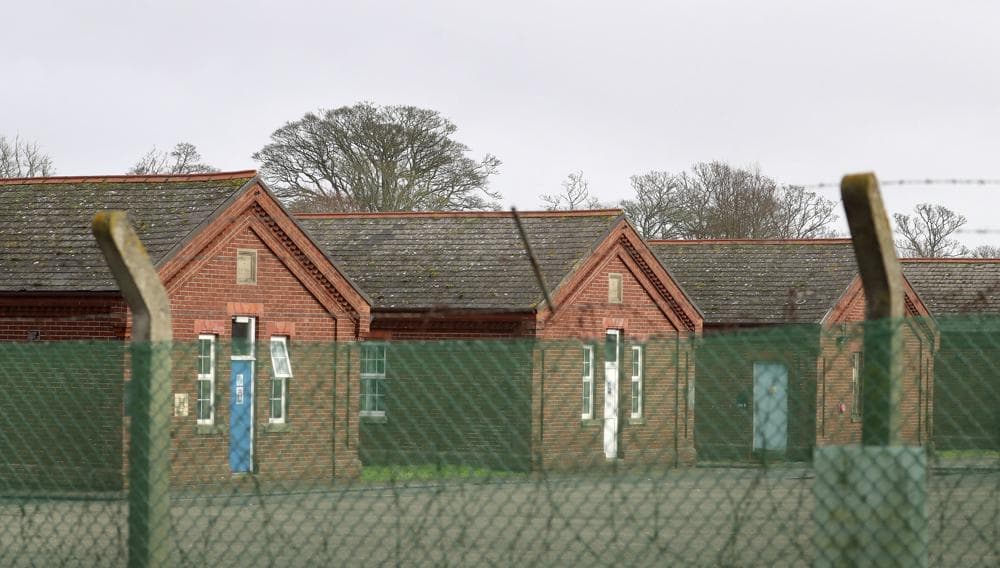LEICESTER, United Kingdom – Britain’s leading Catholic refugee agency is calling for the closure of Napier Barracks, a former military base converted into a migrant detention center.
The facility in Kent was repurposed as accommodation for people seeking asylum in September 2020, in the middle of the COVID-19 pandemic, and houses single men who in the early stages of the asylum process. The United Kingdom had never before uses a quasi-detention setting for those claiming asylum in the country, and many human rights organizations said it was part of the “hostile environment” policy of the government meant to limit the number of immigrants to the country.
Since the facility has opened, it has seen a serious outbreak of COVID-19 and a fire. In June 2021, the High Court ruled that Napier did not meet the minimum legal standards for asylum accommodation, and the government promised improvements.
The Jesuit Refugee Service UK (JRS UK) on Wednesday released Napier Barracks: the inhumane reality, an in-depth report of the experiences of men held in quasi-detention at Napier Barracks, on Wednesday.
“Disused military barracks are especially inappropriate as asylum accommodation. The military barracks are prison-like and institutional. In this report, men have shared how the conditions at Napier are reminiscent of conditions they fled. These quasi-detention conditions expose people to significant re-trauma. This serves no good purpose. It is ghettoizing. It must not be the new normal for asylum accommodation in the UK. It is not too late to turn back,” said Sarah Teather, the Director of JRS UK.
The report notes the Catholic refugee agency ran an outreach service to Napier for two years from October 2020.
“What we saw on the ground was deeply troubling: The site was bleak and rundown, the setting was securitized, the accommodation was crowded. This all took a serious toll on mental health,” the document says.
The report found that asylum seekers were routinely brought to the camp without their prior knowledge, and this caused deep anxiety; the camp was noisy and crowded, and sleeping quarters comprised of large dormitories without privacy; there were serious failures in screening for vulnerabilities at Napier, and survivors of both trafficking and torture continued to be placed and remain there, in contravention of the government’s own guidelines; and it was very difficult, sometimes indeed impossible, to secure legal advice at Napier, and what legal representation was secured was frequently inadequate.
At the same time, the report said Napier felt like a prison to many participants, partly because of its physical setting, and partly because daily life there is tightly regimented.
“Many participants were forced to relive trauma at Napier, closely bound up with its physical camp setting, and its military and prison-like features. All of these things together were deeply damaging to people placed at Napier. Sleep deprivation, a total absence of privacy, and re-trauma from Napier’s institutional setting were mutually reinforcing, and had a profound and cumulative corrosive impact on physical and mental health,” it reads.
Napier Barracks: the inhumane reality was released as the government’s Illegal Migration Bill is being discussed in Parliament. The proposed legislation would bar anyone who arrives in the UK without prior paperwork from ever seeking asylum in the UK.
The report says this legislation represents “a further, profound attack on the very principle of seeking asylum, potentially amounting to a ban on asylum, and, if enacted, would create sweeping new detention powers and entail further expansion of the detention estate.”
JRS UK noted that the Home Secretary – the UK government minister in charge of immigration – had written the introduction to a think tank report calling for open-ended detention in communal accommodation, such as Napier Barracks, being made “the norm for asylum seekers and illegal entrants awaiting relocation to Rwanda or their country of origin,” referring to another British government plan to send asylum seekers to the central African country for processing.
The JRS UK report says many of the most serious and impactive problems with Napier were to do with the nature of institutional accommodation: The total lack of privacy, the sense of isolation, and the lack of agency connected with living life according to a regime.
“What is needed is not modifications or small improvements. It is an entirely different approach. There is no good reason for accommodating asylum seekers in out-of-town asylum camps, rather than in the community,” the report says.
JRS UK says Napier Barracks “must be immediately and permanently closed,” calling it completely unsuitable as accommodation for people seeking sanctuary.
The agency also calls on the government to abandon plans for greater use of large-scale institutional asylum accommodation centers and instead provide asylum seekers with “safe and dignified accommodation” within British communities.
Follow Charles Collins on Twitter: @CharlesinRome















